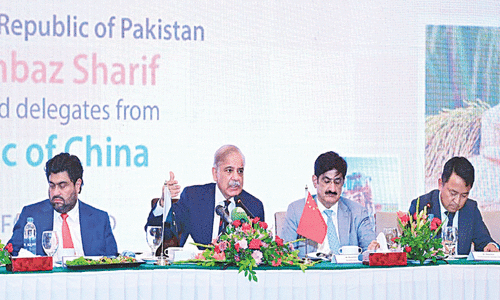ISLAMABAD: Prime Minister Shehbaz Sharif will unveil an economic plan on August 14, which will focus on devising the main principles for real-time export-led growth and removing decade-old economic bottlenecks.
The plan was evolved by a task force constituted by the premier, later joined by Professor of Economic Policy at the University of Oxford Stefan Dercon over the past two months. The local team collated the facts and shared them with the professor to create a consensus document.
Well-placed sources told Dawn that the last meeting on the draft policy titled ‘Home-grown economic plan’ took place on Saturday and is now ready for presentation to the prime minister.
According to the sources, the economic plan’s contents will be disclosed to a large group of stakeholders following Independence Day.
Tariff protection, subsidies to go
The document’s main focus is on economic liberalisation, eliminating the government’s involvement in providing subsidies to any sector and exposing local producers to worldwide competition. There will be no restrictions on imports to manage the current account deficit; instead, the focus will be on increasing exports from the country.
According to a source in the Planning Commission, the evolving document continues the work of former chief economist Dr Muhammad Ahmed Zubair, who was hired by the PTI government.
According to a source, Mr Zubair’s policy statement also addressed structural challenges that hampered growth and elite capture of economic policy formulation. The policy also addressed structural flaws that have resulted in a concentration of export of raw materials and semi-finished products, rather than a shift towards high-value-added products.
Ex-premier Imran Khan approved the three-year implementation plan just a few days before his government was ousted in a no-confidence vote. The approved plan anticipated the export target to be $110 billion by the end of the policy.
However, the PDM government did not approve the policy for implementation. Then, according to the source, the caretaker government began work on establishing a new policy, and this effort is being further led by Planning Minister Ahsan Iqbal.
Mr Ahsan worked with the relevant parties to develop a five-year plan. During the deliberations on the plan, Professor Stefan Dercon penned an op-ed in Dawn in April 2024, advising the new administration to learn five lessons from recent development winners such as Indonesia, Ghana, Bangladesh and India.
According to the source, PM Shehbaz read this article and directed his team to engage Mr Stefan in discussions about the country’s economic plan. He abandoned previous proposed policy plans, including the one developed by his Planning Minister Ahsan Iqbal.
The source said this will be Pakistan’s first economic plan, as the government now only possesses budgetary documents. This document will set the course of the economy as the country has not had any economic plan in place for decades.
Mr Stefan referred to the finance ministry’s budget documents as a strategic blueprint for revenue and expenditure. The budgetary document is export-biased, with import volumes significantly lower than the economy’s needs. He said the lack of direction has caused economic distortions, making exports less competitive.
The economist also identified import tariffs, such as additional customs duty, regulatory duty and export duty, as one of the primary causes of Pakistan’s sluggish export growth. The finance ministry’s budget policy evolved to tax raw materials or semi-finished products, imposing taxes on rising sectors.
The new plan calls for less government participation in running the economy or supporting industries through subsidies or high tariff protection. The policy is based on the whole spirit of neoliberalism, which advocates open capital flow, investment, and a market-driven exchange rate.
Mr Stefen has written a book titled Development Bargain, in which a country’s elites change from safeguarding their positions to betting on a growth-based future.
Despite the flaws of such deals, China is one of the most notable recent success stories, along with Indonesia and less expected destinations like Bangladesh, Ghana, and Ethiopia. Gambling on Development is about these winning attempts, as opposed to countries trapped in elitist bargains that lead nowhere.
Published in Dawn, August 11th, 2024














































Dear visitor, the comments section is undergoing an overhaul and will return soon.